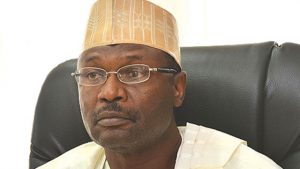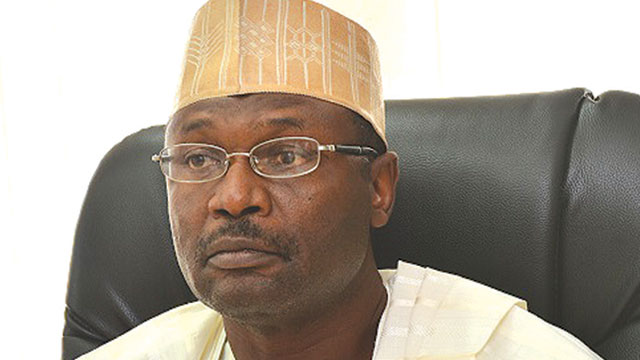
Three officials of the Independent National Electoral Commission, INEC, yesterday, maintained that results of the February 23 presidential election were electronically transmitted to a central server. This is even as a witness, Mr. Mohammed Tata, alleged that he was compelled under duress to sign the presidential election result in his polling unit.
The three INEC officials, who took turns to testify before the Presidential Election Petition Tribunal sitting in Abuja, separately, explained that information captured with the Smart Card Reader machines, were transmitted to the server, using a code they said was given to them by the electoral body.
It will be recalled that INEC had repeatedly debunked claims by the Peoples Democratic Party, PDP, and its candidate, Atiku Abubakar, that it was in possession of a central server that was used for the presidential poll. PDP and Atiku had applied for an order to compel INEC to surrender the said server for inspection, alleging that data they independently secured from the server revealed that President Buhari lost the election with over 1.6million votes.
They alleged that INEC had at various stages of the presidential election unlawfully allocated votes to President Buhari, saying they would adduce oral and documentary evidence to show that results of the election as announced by the electoral body, did not represent the lawful valid votes cast.
Atiku and PDP, in their joint petition marked CA/PEPC/002/2019, alleged that in some states, INEC deducted lawful votes that accrued to them, in its bid to ensure that Buhari was returned back to office.
Determined to prove their case, the petitioners brought witnesses to testify before the five-man tribunal headed by Justice Mohammed Garba. Giving evidence In his evidence-in-chief, Mr. Peter Uzioma Obi said it was wrong for INEC to say the results of the presidential poll were not transmitted electronically.
Obi, who testified as the second witness, said he served as Registration Area Technician at a Ward Level in Rivers State during the election, adding that INEC duly trained him and others on how to transmit results of the election.
Answering questions from INEC’s lawyer, Mr. Usman Yunus, SAN, who queried how the witness could have been able to transmit results when he did not function as a presiding officer, Mr. Obi said: “You are wrong sir. INEC trained us to transmit results. I was not a presiding officer. I was not a polling agent. I was a registration area technician appointed by INEC. I was trained by INEC.”
Responding to another question from Buhari’s lawyer, Chief Wole Olanipekun, SAN, the witness said though he was not aware of guidelines INEC used for the presidential election, he said there was a specific booklet handed to those that acted as Registration Area Technicians (RATECH). “I was a RATECH in charge of the use of card reader,” he insisted, stressing that he was not stationed at any polling unit during the election but only visited the ones where his attention was needed. Mr. Obi told the tribunal that he visited seven polling units in the course of the election. Shortly after he stepped down from the witness box, another INEC official, Mr Adejuyitan Olalekan who served as a Presiding Officer, took over to corroborate his testimony. Olalekan said the electoral body provided a code that was used to transmit the election results to the server. Asked by Buhari’s lawyer if he personally transmitted votes to the sever, the witness said: “I did it myself as a presiding officer. We transmitted result to INEC server through a code that was provided by INEC.” Maintaining that the server was connected to the Smart Card Reader, the witness said he could not remember details of the server. He added that though he could not recollect the code off-hand, he said he could easily retrieve it from his phone if allowed by the tribunal.
Fielding questions from APC’s lawyer, Akin Olujinmi, SAN, the witness said, “Without the code, you cannot make any transmission of results.” He further maintained that INEC did not direct Presiding Officers to allow voters who could not be authenticated by the Card Reader Machine to vote manually after their pictures were captured. He said: “No, we were not directed to allow people to vote manually. The card reader worked for every voter who came to my polling unit.” Similarly, the fourth witness, Mr. Adedokun Adeoye, also claimed that as an Assistant Presiding Officer, he electronically transmitted results of the presidential poll. Asked if he was aware that under INEC guidelines, only the Presiding Officer could transmit results, the witness said it was not true.
Meantime, the fifth witness, Mr. Mohammed Tata alleged that he was compelled under duress to sign result of the presidential election in his polling unit. The witness, who served as an agent of the PDP in Jigawa State told the tribunal that he was threatened to sign a copy of the result or have his name removed as a beneficiary in the N-Power Scheme. Answering a question from INEC’s lawyer, the witness said: “I was harassed and intimidated to sign the result sheet under duress. I was told that if I refuse to sign, my name will be removed from the N-Power Programme.” Asked if he was dissatisfied that President Muhammadu Buhari and the APC scored over 700 votes in his polling unit, the witness said: “There was no score because there was no election.” Continuing he said: “I am a Muslim. I believe in destiny and what God decides will happen. Whether PDP wins or the APC, I don’t have a problem with that. All I want is that I need justice in my country. I don’t care whether my party won or lost, but I am not happy about what happened.” Asked how many parties participated in the election in his polling unit, Mr. Tata said: “I don’t know because there was no election.” Asked if he was given a copy of the result, he said: “No, I was not given because there was no peace.” He decried that though he “followed due process” by reporting how he was harassed to sign the result, he said the culprits were neither arrested nor prosecuted. Asked by APC’s lawyer, Prince Lateef Fagbemi, SAN, why he did not mention names of those that harassed him in his statement on oath, the witness said it was “for security reasons.” “I am still working with the N-Power because I signed the result. It is because I did what they wanted me to do,” he added. The sixth witness, Mr. Mustapha Bello, who served as both polling agent and Ward Collation Officer of the PDP in Borno State, said he refused to sign a blurred copy of the presidential result that was presented to him by INEC officials. Earlier, former ally of President Buhari, Alhaji Buba Galadima testified against him as Atiku’s first witness. Galadima, who was reportedly arrested by the Department of State Services, DSS, before the presidential poll, equally gave reasons why he refused to support Buhari. He told the tribunal that he fell out with Buhari because of the injustice in his administration, lack of inclusiveness and his failure to secure the country. Noting that he supported Buhari in the 2003, 2007, 2011 and 2015 election cycles, Galadima said he switched camp to support Atiku since his former friend failed to keep his campaign promises to Nigerians. Under cross-examination, Galadima denied allegation by Buhari’s lawyer that he was aggrieved because he was not made a minister under the APC administration. “You fell out with the 2nd respondent (Buhari) because he did not make you a minister in 2015,” Olanipekun asked him. In his response, Galadima said: “No. You should know that I fought all the previous governments since 1999 because of injustice. “We made good promises to Nigerians, including justice, inclusiveness and to secure the country, which he has failed to do. “It has always been part of my characteristics to fight injustice.” When he was cross-examined by counsel to the APC, Galadima admitted that the Reformed APC which he spearheaded before the presidential campaigns started, was not a registered political association. Insisting that he remained the Chairman of the group, the PW-1 said he was never sacked by the APC, saying he remained a member of ruling party. “I am still a member of the APC. I have not been sacked. We are in court. I don’t want sub-judice. “I am not a member of PDP, but we have a memorandum of understanding with the PDP to produce God-fearing, good and educated leaders,” he added. Before the tribunal adjourned its proceedings till Tuesday, it admitted into evidence 31 exhibits tendered by the petitioners. Among the exhibits included the Form CF 001 that contained the affidavit and bio data President Buhari submitted to INEC for the purpose of the presidential poll. Though President Buhari, INEC and APC, challenged admissibility of the Form, in line with agreement the parties reached during the pre-hearing stage, all the Respondents said they would give reasons behind their objection in written addresses they would file later. Other exhibits the tribunal admitted in evidence included a document that contained the total number of all the registered voters and the collected Permanent Voters Card for the 2019 election by INEC.





